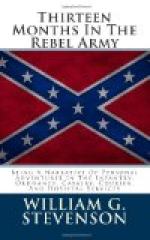“I, A—— B——, solemnly swear, without any mental reservation or evasion, that I will support the Constitution of the United States and the laws made in pursuance thereof; and that I will not take up arms against the United States, or give aid or comfort, or furnish information, directly or indirectly, to any person or persons belonging to any of the so-styled Confederate States who are now or may be in rebellion against the United States. So help me God.”
The other side of the paper contained a military pass, by authority of Lieutenant-colonel J.G. Parkhurst, Military Governor of Murfreesboro. I regarded myself as free from any possible obligation to the Confederates when discharged from their service on account of my wounds at Corinth. In voluntarily taking this oath, I trust I had some just sense of its awful solemnity, for I have never been able to look upon the appeal to God in this judicial form as a light matter. How good men can, satisfy their consciences for the deliberate violation of the oaths which so many of them have deliberately taken to support the Constitution of the United States, I know not. I know what they say in self-defence, for I have often listened to their special pleading. The [Greek: proton pseudos], as my good Professor Owen of the Free Academy would term it—the foundation falsehood—of the whole Secession movement, is the doctrine of State Rights, as held by the South. “I owe allegiance to my State, and, when it commands, obedience to the United States.” This idea has complete possession of the leading minds, and a belief in it accounts for the conduct of many noble men, who resisted Secession resolutely until their State was carried for the Rebellion. Whenever a State act was passed they yielded, and the people were a unit.
In addition to this fundamental error, they aver that they are engaged in a revolution, not a rebellion; and that the right of revolution is conceded, even by the North, now endeavoring to force them back into an oppressive and hated union; and that if we justify our fathers in forswearing allegiance to the British crown, we should not condemn the South in refusing obedience to a Union already dissolved. If this were as good an argument as it is a fallacious one, ignoring as it does the total dissimilarity in the two cases, and assuming falsely that the Union is already dissolved, it fails to justify the individual oath-breaking of many of the leaders in the revolt. They swore to support the Constitution of the United States at the very time they were meaning to destroy it. Some of them took the oath as Cabinet officers and members of Congress, that they might have the better opportunity to overthrow the government. The truth must be admitted—and here lies the darkest blot upon the characters of the arch-conspirators—they know not the sanctity of an oath, nor regard its solemn pledges and imprecations. They have shown, it has been eloquently said, the utmost recklessness




